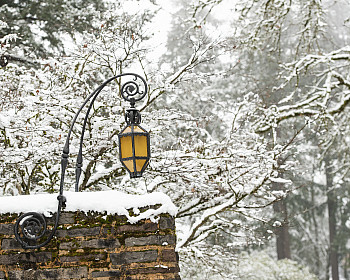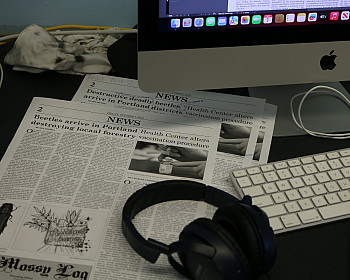Hannah Exler
The small school climate encouraged me to get to know my professors and get support in office hours. Because I knew that my professors knew me, I felt more accountable for myself personally and academically.

Pronouns
Degree and Class Year
Hometown
Current City
Major
Extracurriculars
Job Title, Organization
Continuing Studies
What three words would you use to describe L&C?
What was your favorite class? How has it expanded your knowledge?
This is such a hard question to answer! I took Modern German History with Maureen Healy my first year, and that was the class that made me want to major in history. I remember reading a book called Ordinary Men that explored how ordinary German men were transformed into Nazi soldiers, and ultimately, murderers. It was a whole new perspective that I had never learned about. The most moving class that I have taken was Education in a Complex World with Alejandra Favela. We got to spend part of the class at a high school in Portland and were able to work in classrooms, which was a fantastic experience for me as I hope to become a teacher. I learned so much about interacting with students, and overall it was an incredible experience.
What made you want to come to Lewis & Clark?
I was initially attracted to Lewis & Clark for many of the reasons most people are: it is a small liberal arts college located in a beautiful place. My visit to campus was really what made the decision for me. I sat in on a gender studies class, and I remember thinking to myself, “Wow, everyone here is so intelligent and has so many interesting things to say.” I wanted to be at a school where the students were eager to go to class and learn, and I really gravitated toward the small, conversational classrooms.
What did your time in Spain add to your L&C experience?
I honestly did not plan on studying abroad—the idea intimidated me too much. As a sophomore, though, I heard many of my friends talking about their plans to go abroad, so I tagged along to the overseas meeting. If I went abroad, I knew I wanted to be on an English-speaking program because I felt unprepared to use the Spanish I had learned in high school and college. I went to the Ireland station first, and wasn’t super impressed (the program just didn’t seem like it was for me). I walked toward the Sevilla station out of curiosity, and when I got there, the former trip leader could not stop talking about how amazing the program was. I can’t quite describe why, but I was immediately excited about this program—even though I wasn’t planning on going to a Spanish-speaking country. I grew SO much from my time in Spain. Not only did my Spanish improve immensely, but I learned a lot about myself. I saw so many incredible places and met some truly wonderful people. Going abroad (regardless of where you go) is always such a learning experience. Going as a student is definitely a once-in-a-lifetime experience, and one I wouldn’t change for anything.
What advice do you have for prospective students?
Get to know your professors! Seriously—this is one of the best things about academics at Lewis & Clark. Forming a relationship with your professors is not only beneficial for your grades, but it makes your classes so much more enjoyable. Graduating from Lewis & Clark this semester and knowing that I have a few professors that have gotten to know me as a student and a person feels really nice. As for another piece of advice, I would tell prospective students to not be afraid to reach out in various places for friends, hobbies, and extracurriculars. I have found that the places on campus that I am most happy are places that I did not initially see myself.
What have you been doing since graduation?
After graduation, I began a yearlong student teaching and Masters program in the Bay Area. After that, I began my first year of teaching high school history and have now been teaching for four years. I am planning on relocating back to the LA area where I grew up at the end of this school year to continue teaching high school.
How did Lewis & Clark prepare you for post-college life?
Being at Lewis & Clark taught me that support and success manifest in the relationships and connections one builds. Whether it was in class, clubs, or social interactions with peers, I felt my best when I felt connected with others. In a more academic sense, I think Lewis & Clark’s rigorous history department prepared me to write, analyze, and think critically.
Why did you major in history?
I initially planned on majoring in English, however, my mind changed after taking Mo Healy’s Modern German History class the first semester of my first year. I had never felt so excited to learn history, and I found myself signing up for more history classes than English the following semester.
What would you say is the most important thing you learned at Lewis & Clark?
Self advocacy! The small school climate encouraged me to get to know my professors and get support in office hours. Because I knew that my professors knew me, I felt more accountable for myself personally and academically.
How do you stay connected to Lewis & Clark as an alum?
I have attended alumni regional happy hours over the years and I try to keep in touch with former professors and peers as best as I can. However, I think I feel the most connected to Lewis & Clark in my daily life as a high school teacher. I often find myself thinking about my professors in the history department and I hear their words as I write curriculum and teach my students, and I aspire to show the same excitement and passion for history as they did for me; it really made all the difference.
More Admissions Stories
Admissions is located in Frank Manor House on the Undergraduate Campus.
MSC: 32
email admissions@lclark.edu
voice 503-768-7040
fax 503-768-7055
Vice President of Admissions and Financial Aid
Eric Staab
Admissions
Lewis & Clark
615 S. Palatine Hill Road
Portland OR 97219


